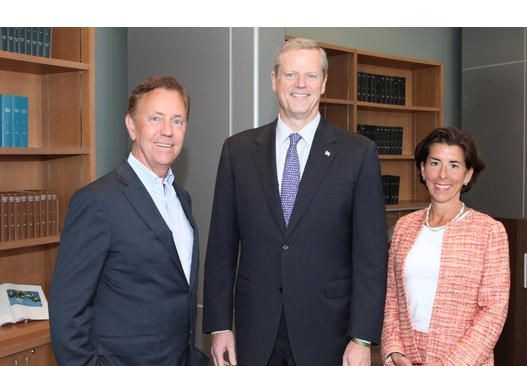latest
Baker pulls plug on transportation emissions compact

By Chris Lisinski
State House News Service
NOV. 18, 2021…..After years of touting a multi-state compact to reduce transportation sector carbon emissions as “critical” to achieving environmental goals in Massachusetts, the Baker administration on Thursday effectively scrapped its participation and declared the program “no longer the best solution.”
Gov. Charlie Baker had long been one of the most vocal proponents of the Transportation Climate Initiative, touting it as an essential component of the state’s effort to rein in the largest source of greenhouse gas emissions.
But expected impacts on gas prices have caused many to shy away from the compact and with support for the compact in other states crumbling or simply failing to materialize, Baker’s office signaled on Thursday that it would pull the plug.
“The Baker-Polito Administration always maintained the Commonwealth would only move forward with TCI if multiple states committed, and, as that does not exist, the transportation climate initiative is no longer the best solution for the Commonwealth’s transportation and environmental needs,” Baker press secretary Terry MacCormack said in a statement.
“At the same time, the new federal infrastructure funding package, American Rescue Plan investments, as well as tax revenue surpluses generated by Massachusetts’ strong economic recovery make the Commonwealth better positioned to upgrade its roads, bridges and public transportation systems, while also making investments to reduce transportation emissions, deliver equitable transportation solutions and benefits and meet the state’s ambitious climate goals,” MacCormack added.
The administration’s decision comes less than a year after Massachusetts, Rhode Island, Connecticut and Washington D.C. — already a smaller contingent than the 13 governments that participated in discussions about the program — signed on as initial TCI members.
Baker’s announcement follows that of Connecticut Gov. Ned Lamont, who on Tuesday said he did not believe he could get legislative support for the multi-state compact.
TCI’s demise represents the second major blow to clean energy efforts this month after Maine voters rejected a transmission project that Massachusetts has been counting on to draw clean hydropower down from Canada.
It also stands as a victory for opponents of the program, including Republican gubernatorial candidate Geoff Diehl, who could face off against Baker in a primary election next year if the governor decides to seek a third term.
Since the early days of TCI discussions, the planned cap-and-invest program faced vocal opposition from groups such as the Massachusetts Fiscal Alliance, who argued that its impact on fuel costs would harm consumers more than backers anticipated.
“TCI is a regressive gas tax scheme that would have hurt middle class and the working poor the most. It’s such wonderful news to see that Massachusetts families will not be forced to endure the economic hardship TCI would have imposed upon them,” MassFiscal spokesperson Paul Craney said in a statement celebrating the Baker administration’s announcement.
“MassFiscal took a lot of punches for usually being the loudest voice against TCI. At times, we were the only voice,” Craney continued. “We worked diligently to ensure people knew exactly what it was that policy makers were getting our state into and by the end we formed a solid and robust coalition of opponents. MassFiscal is stronger for the effort. Ultimately, it’s the everyday citizens of Massachusetts that benefited the most for our persistent advocacy to see the program ended and never settling for anything less than its defeat.”
The Baker administration will now face increased pressure to roll out backup plans for fulfilling renewable energy needs and cutting greenhouse gas emissions without TCI, particularly with interim targets looming along the road to achieving net-zero emissions by 2050.
Sen. Michael Barrett, who co-chairs the Telecommunications, Utilities and Energy Committee, said Thursday that the decision is a “major setback” even if it does not come as a surprise.
“The collapse of the centerpiece of our climate transportation strategy calls for the governor’s immediate attention and some very aggressive substitutions,” he said. “Climate isn’t going to give us a pass because Plan A collapsed. That’s not the way this works.”
Backers of TCI, which the Baker administration was leading through its environmental secretariat, envisioned a regional program capping vehicle emissions and allowing fuel suppliers to purchase allowances for carbon dioxide their products would emit.
When the founding coalition launched last winter, members set an initial target of reducing carbon emissions 26 percent by 2032. They estimated that shift would add 5 to 9 cents to the price of a gallon of gas and generate more than $366 million in revenue for participating governments, which could then be invested in clean transportation and energy improvements.
The transportation sector accounted for 42 percent of the Bay State’s greenhouse gas emissions in 2017, the most recent year for which data was available, outpacing any other source.
Transportation Committee Co-chair Rep. Bill Straus on Thursday said he hopes the decision to withdraw from TCI will refocus attention toward broader transportation funding questions.
“As gas tax revenue becomes a smaller part of the picture over the next decade, the need to provide funding to take care of our public transit, roads and bridges becomes even more important,” Straus said in a statement. “Frankly TCI was a distraction in getting that discussion going since it’s been apparent for the last couple of years that a New England consensus on raising gas fees through this method was never going to happen.”
With a sizable pot of money, the Baker administration appears confident that it can invest to help cut emissions and advance clean energy in other ways.
Massachusetts is poised to receive at least $10 billion for transportation infrastructure under the bill President Joe Biden signed, according to Baker’s office, combined with billions more in American Rescue Plan Act funding.
The state committed to procuring 5,600 megawatts of offshore wind through projects such as Vineyard Wind, and the administration has also targeted significant incentive programs to speed up adoption of electric vehicles.
Barrett, who last week attended a United Nations climate change conference in Glasgow, Scotland, said he wants to see the state embrace a ban on the sale of gasoline-fueled vehicles by 2035, calling it “ambitious enough to substitute for the setback we’re seeing today.”
The Baker administration has committed to allowing sales of only zero-emission passenger vehicles by 2035, and Barrett said he hopes the administration will “codify” that in state law with a firm ban on gasoline cars and trucks.
Some Republican leaders, such as Rep. David DeCoste and Geoff Diehl, have been seeking a potential November 2022 ballot question seeking to undermine the state’s participation in TCI.
Asked Thursday if supporters would continue to push the question after the administration effectively withdrew from the program, Craney said it is “too early to know” amid certification of voter signatures.
Diehl could not be reached for immediate comment Thursday afternoon. In 2014 he led a successful ballot initiative to reverse the state law indexing the gas tax to inflation and he has knocked TCI as a “gas tax” that is “designed to urge drivers to buy electric cars by raising the price of gasoline until it becomes unaffordable.”
“TCI may be sold to you by the Administration as a ‘fee’ to energy retailers but is nothing more than another TAX on the people,” Diehl, a former state representative, wrote in August. “Commuting costs will increase, food and goods that need to be transported will go up, and even your property taxes will reflect the increased cost to municipalities for the fleets they operate – Police cars, fire trucks and ambulances and school buses.”
[Michael P. Norton contributed reporting.]







You must be logged in to post a comment Login